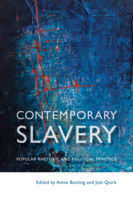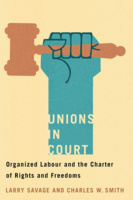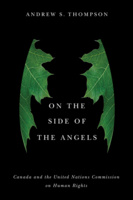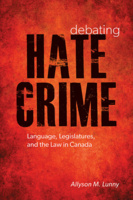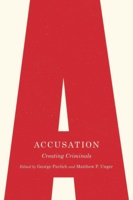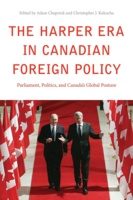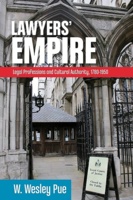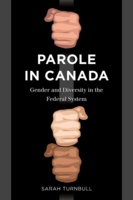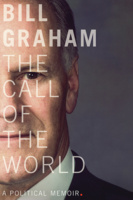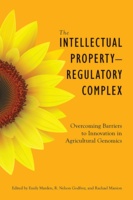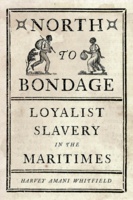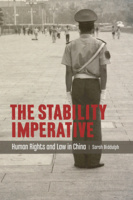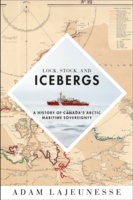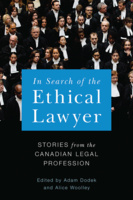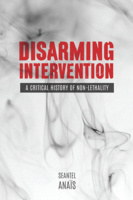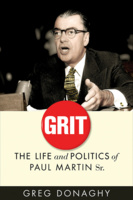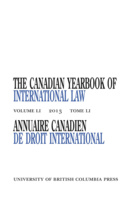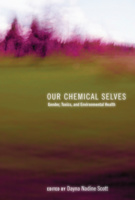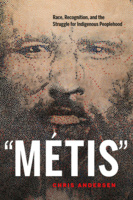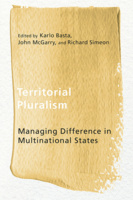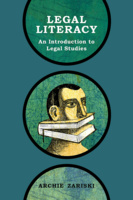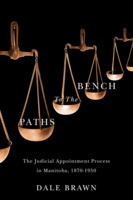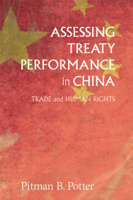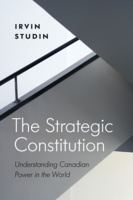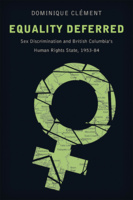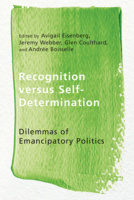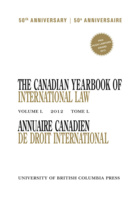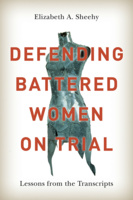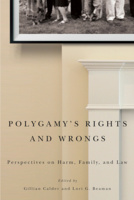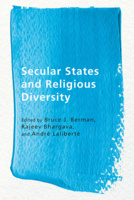The New Lawyer, Second Edition
How Clients Are Transforming the Practice of Law
The New Lawyer analyzes the changes that are transforming the role of lawyers, the nature of client service, and how law is practised – including how lawyers seek resolution before trial – to stress the need for new approaches to lawyer/client collaboration if the legal profession is to remain relevant in the twenty-first century.
Contemporary Slavery
Popular Rhetoric and Political Practice
This volume brings together a cast of leading experts to carefully explore how the language of slavery has been invoked to support a series of government interventions, activist projects, legal instruments, and rhetorical and visual performances.
Unions in Court
Organized Labour and the Charter of Rights and Freedoms
This book demonstrates how and why labour’s long-standing distrust of the legal system has given way to a Charter-based legal strategy designed to protect workers’ rights and freedoms.
On the Side of the Angels
Canada and the United Nations Commission on Human Rights
Documenting six decades of Canadian engagement within the UN human rights system, this book offers insights into the complexity and nuance of Canadian diplomacy as well as the evolution of UN’s universal human rights project.
Debating Hate Crime
Language, Legislatures, and the Law in Canada
Delving into the language used by parliamentarians, senators, and committee witnesses to debate Canada’s hate laws, this book analyzes passionate discourse surrounding victimization, rightful citizenship, social threat, and moral erosion.
Contesting Elder Abuse and Neglect
Ageism, Risk, and the Rhetoric of Rights in the Mistreatment of Older People
Drawing on twenty years of original, interdisciplinary research, Contesting Elder Abuse and Neglect explores how and why the mistreatment of older people became known as “elder abuse and neglect” and the consequences of this designation.
Accusation
Creating Criminals
This interdisciplinary collection challenges conventional views on crime and criminals, examining how ideas and rituals of criminal accusation produce both accusers and accused.
Behind the Walls
Inmates and Correctional Officers on the State of Canadian Prisons
Based on candid conversations with inmates and correctional officers in federal and provincial prisons, Behind the Walls offers an up-to-date and balanced account of the corrections landscape in Canada.
Uncertain Accommodation
Aboriginal Identity and Group Rights in the Supreme Court of Canada
A bold analysis of what happened when Canada attempted to extend group rights to Aboriginal people in the early 1980s and why it went wrong.
The Harper Era in Canadian Foreign Policy
Parliament, Politics, and Canada’s Global Posture
The first comprehensive analysis of Canadian foreign policy during the Harper era.
New Treaty, New Tradition
Reconciling New Zealand and Maori Law
Maori author and legal scholar Carwyn Jones provides a nuanced analysis, enhanced by storytelling, of the New Zealand land claims process to draw attention to the cultural implications of Indigenous self-determination, settlement negotiations, and reconciliation projects around the globe.
Lawyers’ Empire
Legal Professions and Cultural Authority, 1780-1950
In approaching the history of the legal professions through the lens of cultural history, Wes Pue locates the legal profession within England and its empire, supplementing and disrupting established narratives of professionalism as proffered by lawyers and their critics.
Parole in Canada
Gender and Diversity in the Federal System
Parole in Canada explores how concerns about aboriginality, gender, and the multicultural ideal of “diversity” have altered parole policy and practice – and asks whether these changes go far enough.
The Call of the World
A Political Memoir
In this fiercely intelligent memoir, Bill Graham – Canada’s minister of foreign affairs and minister of defence during the tumultuous years following 9/11 – takes us on a personal journey through a period of upheaval in global and domestic politics, arguing that global institutions based on international law offer the best hope for a safer, more prosperous, and just world.
Fragile Settlements
Aboriginal Peoples, Law, and Resistance in South-West Australia and Prairie Canada
Fragile Settlements compares the historical processes through which British colonial authority was asserted over Indigenous people in southwest Australia and prairie Canada from the 1830s to the early twentieth century.
The Intellectual Property–Regulatory Complex
Overcoming Barriers to Innovation in Agricultural Genomics
This book offers a pathway forward for innovation in agricultural genomics by identifying and addressing the significant obstacles posed by conflicting intellectual property and biosafety regimes.
Queer Mobilizations
Social Movement Activism and Canadian Public Policy
Canada is considered a leader when it comes to LGBTQ rights, but as Queer Mobilizations shows, this has less to do with progressive politicians than with the work of queer activists who have fought for policy changes from their local city halls to the chambers of Parliament.
Patriation and Its Consequences
Constitution Making in Canada
Patriation and Its Consequences examines the political events and struggles that resulted in the 1981 agreement to patriate the Canadian constitution and sheds light on the political consequences of this key moment in Canadian history.
North to Bondage
Loyalist Slavery in the Maritimes
The first history of black slavery in the Maritimes, North to Bondage is a startling corrective to the enduring myth of Canada as a land of freedom at the end of the Underground Railroad.
The Stability Imperative
Human Rights and Law in China
Legal expert Sarah Biddulph uses case studies to examine the multiple and shifting ways in which the Chinese government’s efforts to maintain social and political stability impact on the legal definition and implementation of human rights in China.
Lock, Stock, and Icebergs
A History of Canada’s Arctic Maritime Sovereignty
Lock, Stock, and Icebergs recounts the events, pressures, and behind-the-scenes negotiations that shaped Canada’s legal claim to the Northwest Passage and the waters of the Arctic Archipelago.
In Search of the Ethical Lawyer
Stories from the Canadian Legal Profession
Delving into some of the most challenging issues to confront legal professionals, this book raises important questions about what it means to be an ethical lawyer in Canada.
Public Interest, Private Property
Law and Planning Policy in Canada
Through selected case studies, this volume explores the complex interplay between the public interest and private property rights in Canadian urban-planning policy.
Cleaner, Greener, Healthier
A Prescription for Stronger Canadian Environmental Laws and Policies
David R. Boyd reveals striking weaknesses in Canadian environmental law, describes the damage these flaws are wreaking on human health, and identifies practical, proven, and affordable solutions to these problems.
Disarming Intervention
A Critical History of Non-Lethality
Disarming Intervention traces the social, historical, and legal legitimization of non-lethal weapons in the United States.
When Good Drugs Go Bad
Opium, Medicine, and the Origins of Canada’s Drug Laws
This intoxicating look at the history of drug regulation in Canada reveals how a variety of social and political forces converged at the turn of the twentieth century to transform both public attitudes toward, and access to, narcotics.
Grit
The Life and Politics of Paul Martin Sr.
Grit examines the remarkable life and political career of Paul Martin Sr., a liberal reformer and cabinet minister from 1945 to 1968, who championed health care and pension rights, new meanings for Canadian citizenship, and internationalism in world affairs.
The Honour and Dishonour of the Crown
Making Sense of Aboriginal Law in Canada
Unique within Canadian legal writing, this book unpacks the complex conceptual differences between the fiduciary duty of the Crown and the honour of the Crown.
Putting the State on Trial
The Policing of Protest during the G20 Summit
Not only were peaceful protestors and innocent bystanders assaulted by police during the G20 Summit in Toronto in June 2010, but the constitutional rights of Canadians were as well. This book contextualizes the events and examines what should be done to safeguard the rights of Canadians to freedom of speech, peaceful assembly, and freedom from arbitrary arrest and detention in the future.
The Canadian Yearbook of International Law, Vol. 51
Our Chemical Selves
Gender, Toxics, and Environmental Health
This collection provides a critical, interdisciplinary analysis of how everyday exposures to common chemicals are adversely affecting the health of Canadians and reveals the connections between social inequity, environmental risks, and the gendered division of health burdens in Canada.
Nationhood Interrupted
Revitalizing nêhiyaw Legal Systems
Co-founder of the international movement Idle No More, Sylvia McAdam shares nêhiyaw (Cree) laws so that future generations may understand and live by them, revitalizing Indigenous nationhood.
Moving Aboriginal Health Forward
Discarding Canada’s Legal Barriers
This comprehensive analysis of Aboriginal health statistics, historical practices, and legal principles in Canadian law provides a practical framework for the reconciliation of Aboriginal health and healing practices within Canadian society.
Territorial Pluralism
Managing Difference in Multinational States
This volume examines the implications of territorial pluralism for the peaceful and democratic management of difference in states characterized by ethnic, national, linguistic, or cultural divisions.
Legal Literacy
An Introduction to Legal Studies
Legal Literacy provides a foundational understanding of key concepts such as legal personhood, jurisdiction, and precedent, and by introducing students to legal research and writing skills.
Paths to the Bench
The Judicial Appointment Process in Manitoba, 1870-1950
A close study of the judges appointed in early 20th-century Manitoba, revealing Canada’s highly political judicial appointment process.
Assessing Treaty Performance in China
Trade and Human Rights
This volume examines the normative and operational dimensions of China’s legal performance related to international standards on trade and human rights.
Land Use and Society, Third Edition
Geography, Law, and Public Policy
This third edition has been updated with data from the 2010 U.S. Census and revised with the input of academics and professors to address the changing issues in land use, policy, and law today.
The Strategic Constitution
Understanding Canadian Power in the World
Bridging the solitudes of constitutional law and international relations, this book offers a brand new interpretation of Canada’s Constitution.
Equality Deferred
Sex Discrimination and British Columbia’s Human Rights State, 1953-84
A history of human rights law in Canada, with a focus on sex discrimination in British Columbia.
Recognition versus Self-Determination
Dilemmas of Emancipatory Politics
This book re-evaluates the role of recognition in analyzing relations between groups in plural societies, the position of indigenous peoples in settler societies, and the principle of the self-determination of peoples.
The Canadian Yearbook of International Law, Vol. 50, 2012
Revisiting the Duty to Consult Aboriginal Peoples
The duty to consult has a fundamental importance for all Canadians, yet misunderstandings of the doctrine remain widespread; this book addresses those misconceptions.
Defending Battered Women on Trial
Lessons from the Transcripts
Drawing on trial transcripts, this book tells the stories of ten battered women who killed their male partners and one who did not, revealing why women don’t “just leave” and the serious barriers to achieving acquittal.
Polygamy’s Rights and Wrongs
Perspectives on Harm, Family, and Law
Eleven diverse scholars interrogate the belief that polygamy is inherently harmful, questioning the ways in which society assigns value to family and intimacy, and its right to do so.
Secular States and Religious Diversity
Examines the limitations and dilemmas of government responses to religious diversity and how secular states deal (and should deal) with such pluralism.
To Right Historical Wrongs
Race, Gender, and Sentencing in Canada
A bold questioning of culture-based reparative justice initiatives – the political culture that inspired them and their efficacy in an age in which historically marginalized people are disproportionately represented in Canadian prisons.
Chinese Comfort Women
Testimonies from Imperial Japan’s Sex Slaves
This is the first English-language book to record the experiences and testimonies of Chinese women abducted and detained as sex slaves in Japanese military “comfort stations” during Japan’s 1931-45 invasion of China.
Death or Deliverance
Canadian Courts Martial in the Great War
In this eye-opening account of military law in the Great War, courts martials emerge not as brutal, merciless dispensers of frontline justice but as courts capable of mercy.


